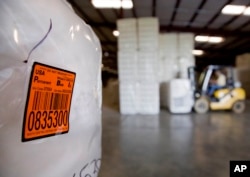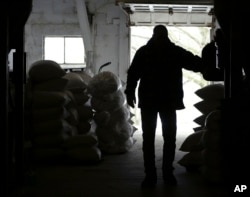Time and effort have gone down the drain for Steve Gould, who is scrambling to find new customers for his gin, whiskey and other spirits since the United States has taken a tough stance on trade issues.
Before the European Union retaliated against new U.S. tariffs with taxes of its own, Gould expected revenue from the EU at his Golden Moon Distillery in Colorado to reach $250,000 or $350,000 this year. Now he's concerned that European exports will total just $25,000. Golden Moon already saw an effect when then-candidate Donald Trump made trade an issue during the 2016 campaign. Gould lost one of his Mexican importers and an investor, as overseas demand for small-distiller spirits was growing.
"We've lost years of work and hundreds of thousands of dollars in building relationships with offshore markets," says Gould, who's hoping to find new customers in countries like Japan.
President Donald Trump's aggressive trade policies are taking a toll on small U.S. manufacturers. The president has imposed tariffs of 25 percent on steel and 10 percent on aluminum imports from most of the world, including Europe, Mexico and Canada, driving up costs for companies that rely on those metals. And he has slapped 25 percent taxes on $34 billion in Chinese imports in a separate trade dispute, targeting mostly machinery and industrial components so far. Trump's tariffs have drawn retaliation from around the world. China is taxing American soybeans, among other things; the European Union has hit Harley-Davidson motorcycles and Kentucky bourbon; Canada has imposed tariffs on a range of products — from U.S. steel to dishwasher detergent.
More businesses could be feeling the pain as the trade disputes escalate — the administration on Tuesday threatened to impose 10 percent tariffs on thousands of Chinese products including fish, apples and burglar alarms. And China responded with a tariff threat of its own, although it didn't say what U.S. exports would be targeted.
Small businesses are particularly vulnerable to tariffs because they lack the financial resources larger companies have to absorb higher costs. Large companies can move production overseas — as Harley-Davidson recently announced it would do to escape 25 percent retaliatory tariffs in Europe. But "if you're a small firm, it's much harder to do that; you don't have an international network of production locations," says Lee Branstetter, professor of economics and public policy at Carnegie Mellon University's Heinz College.
Shifting manufacturing away from items that use components that are being taxed is also harder since small businesses tend to make fewer products, he says. And if tariffs make it too expensive to export to their current markets, small companies may not be able to afford the effort of finding new ones.
Small-business owners have been growing more confident over the past year as the economy has been strong, and they've been hiring at a steady if not robust pace. But those hurt by tariffs are can lose their optimism and appetite for growth within a few months.
"They have narrow profit margins and it's a tax," says Kent Jones, an economics professor at Babson College. "That lowers their profit margins and increases the possibility of layoffs and even bankruptcies."
Yacht company
Bertram Yachts is one company finding it trickier to maneuver. The U.S. has put a 25 percent tariff on hundreds of boat parts imported from China, where most marine components are made. And European countries have imposed a 25 percent tariff on U.S.-made boats. Last year, Bertram exported about a third of its boats, with half going to Europe.
"We have been squeezed on both sides," says Peter Truslow, CEO of the Tampa, Florida-based boat maker.
Truslow doesn't know how the tariffs will affect the company's sales and profits, but dealers he's spoken to in Europe have already gotten cancellations on boats that run into the millions of dollars. Bertram plans to try to build up its strong U.S. business and seek more customers in countries that aren't involved in trade disputes with the U.S., including Japan and Australia.
Still, the company's growth and job creation stand to slow. "It's probably going to be more about a reduction in hiring than it is about layoffs," Truslow says.
The ripples are being felt across the industry, says Tom Dammrich, president of the National Marine Manufacturers Association trade group. He estimates there are about 1,000 manufacturers, almost all small or mid-size businesses, and says some parts can only be bought from China.
Metal fabrication
Matt Barton's metal fabrication company, which makes custom replacement parts for farm equipment, outdoor signs and people who race hot rods, is paying its suppliers up to 20 percent more for metals than it did a year ago.
Prices had soared as much as 40 percent months ago amid expectations of U.S. tariffs on aluminum and steel. They have since steadied, but are expected to remain high for three to six months. Barton's Pittsboro, Indiana-based company, The Hero Lab, is absorbing part of the increases. Some racing customers are still delaying orders.
"What they budgeted to cost $1,000 now is now $1,200 or $1,500," Barton says. "They're pushing their orders back four to six weeks, waiting for a few more paychecks to come in."
Cheese maker
Jeff Schwager's cheese company, Sartori, is selling products to Mexico at break-even prices because of that nation's retaliatory 25 percent tariff. Twelve percent of the Plymouth, Wisconsin-based company's revenue comes from exports, which is the fastest-growing segment of the business.
Sartori and its Mexican importer are each absorbing half the costs of the tariff. Schwager, the CEO, doesn't see leaving the Mexican market as an option.
"If you lose space on the grocery store shelf, or you're taken out of recipes in restaurants, that takes years to get back," he says. He hopes the trade dispute can be resolved and tariffs rolled back.
Flatware maker
But some small manufacturers believe they can benefit from a trade dispute. Greg Owens, president of flatware maker Sherrill Manufacturing, says if his competitors in China are hit by U.S. tariffs, he could see revenue increase.
"They would have to raise the retail price, which would allow us to raise our prices," says Owens, whose company is located in Sherrill, New York. In turn, Owens says, that would allow "long overdue" raises for workers and upgrades to capital equipment.






